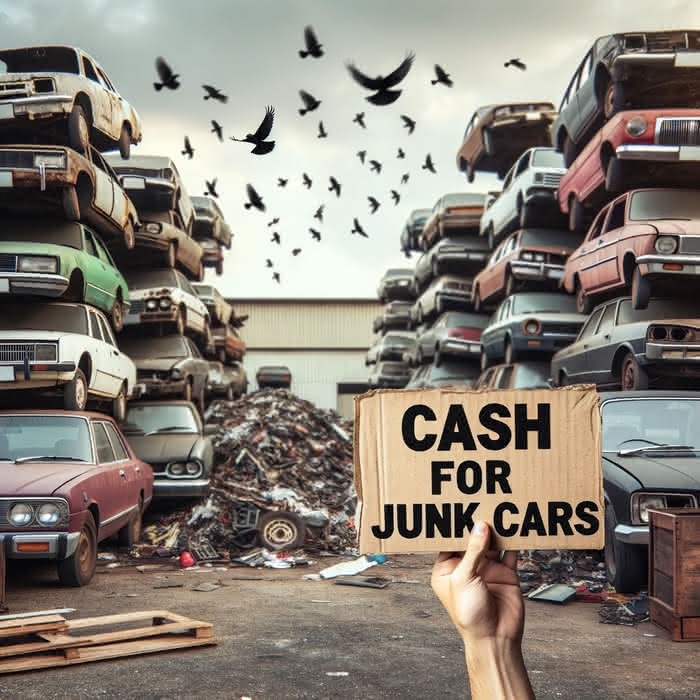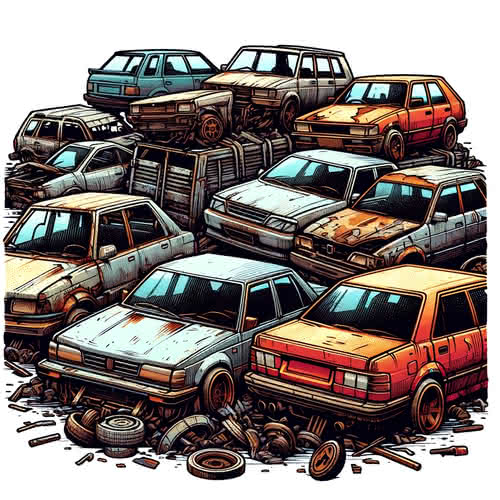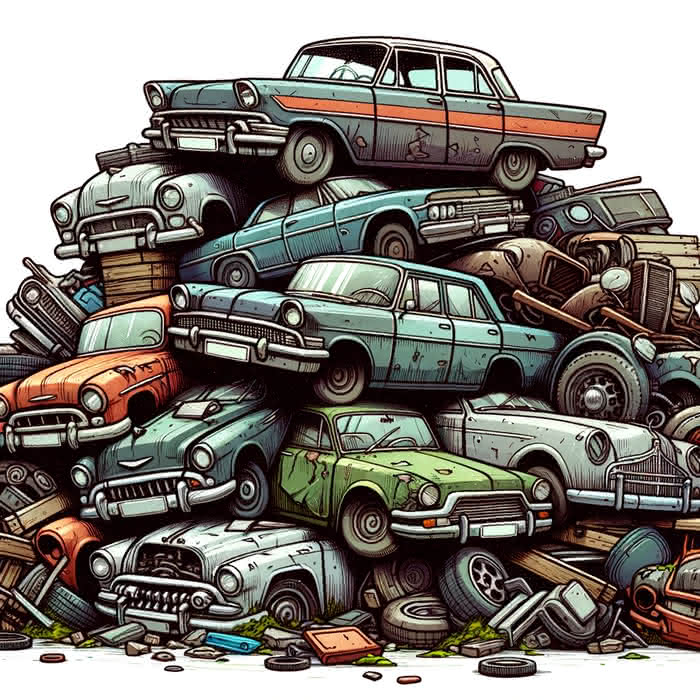Well, I Finally Sold That Old Junk Car in My Yard to a Salvage Yard
That old car in my yard had become an eyesore, and I began to wonder if it could be worth something. After looking into it, I decided to sell it. I contacted a local salvage yard, negotiated a bit, and traded my old car for cash. It felt good to clear up my yard and have some extra cash.
Here’s a specific example from my experience: When I first thought about selling the car, I wasn’t sure where to start. I decided to call several salvage yards to understand the going rate for a vehicle like mine. I noted the varying offers and the conditions each yard had for buying my car. One yard, in particular, offered free towing, which was a deciding factor for me because the car wasn’t running. I also made sure to have my car’s title on hand to avoid any delays. This preparation made the selling process straightforward.
When I finally decided on the best offer, the transaction was quick, and I avoided any unforeseen hold-ups because I had all the necessary paperwork ready.
Summary of Info
- Assessing the condition of the car and its salvageable components is crucial in determining its value.
- Researching prices for similar cars helps set a reasonable expectation and attract potential buyers.
- Contacting multiple salvage yards and negotiating with them can result in a better deal for selling the car.
- Finalizing the sale involves signing necessary documents and arranging for the salvage yard to collect the car, often providing free towing service.
Assessing My Car’s Value
When I decided to figure out how much my old car was worth, I evaluated its condition and components that might still have value. It had been parked unused for a long time, and I was aware that even vehicles in poor shape could be sold. I’m not an auto specialist, but I checked it carefully.
I started with the engine. Although it was beyond repair, some components appeared salvageable. The battery was no good, but the alternator looked serviceable. The interior was another matter – the upholstery showed significant wear and the dashboard was damaged from sun exposure, but the radio was still functional. I even turned it on to make sure.
The tires were too worn to be useful, but the wheels might interest someone who appreciated vintage parts. I took notes on all the details, because I knew that even small parts could increase the value when selling a car.
Next, I used the internet to find prices for cars in a similar state to mine. My aim was a reasonable price, not an optimistic one. I wanted to have an idea of what to expect so I wouldn’t accept too low an offer. My car wasn’t going to bring in a fortune, but I was determined to get a fair price for it.
Here’s a personal example from my experience: Once, when trying to sell a car, I found that it had a particular type of alloy wheels that were desirable. I highlighted this feature when advertising the car, and it attracted a buyer who was restoring a similar model. They were willing to pay more for my car just because of these wheels. This taught me that knowing specific details about your car’s parts can attract buyers who value those particular features.
The Salvage Yard Journey
After evaluating my car’s parts, I discovered some were worth saving, so I contacted various local salvage yards to see who’d offer a good price. This process required calling for quotes and discussing prices over the phone. I asked specific questions like, ‘What’s your offer for an engine block?’ or ‘Can you buy the car as it is?’ Each yard presented a different offer for my car’s parts.
I chose a salvage yard that offered a fair price. They agreed to collect the car without trouble and provided a free towing service. The representative was helpful and explained the next steps, simply asking me to sign the required documents.
As the tow truck pulled my car away, I felt both relieved and sentimental. It marked the end of my time with that car, but I was glad to have gained some money from it. My experience with the salvage yard was a practical learning opportunity, and I ended up with extra cash.
Here’s a specific example: When I was negotiating over the phone, I mentioned that another yard had offered a slightly higher amount. This prompted the buyer to increase their offer to secure the deal. This tactic can be particularly effective when you have genuine offers from competitors, as it demonstrates to buyers that your parts are in demand.
Frequently Asked Questions
How Do I Handle the Paperwork and Legal Requirements for Selling a Car to a Salvage Yard?
Recently, I sold my car to a salvage yard and learned quite a bit about the process. I started by officially handing over the vehicle’s title to the salvage yard, which is a critical step in transferring ownership. This involves filling out the transfer section of the title with accurate details about the sale. I made sure to keep a copy of the signed title for my records. After that, I contacted my insurance company to usatoday.com cancel the policy on the vehicle. There’s no need to keep paying for insurance on a car you no longer own. The final step was to notify the Department of Motor Vehicles (DMV) about the sale, which can usually be done online or with a quick visit to their office. They often require a form to be filled out, detailing the transaction. This step ensures I am no longer liable for the vehicle. Each of these tasks was essential to finalize the sale and avoid any future legal or financial surprises related to the car.
Are There Any Environmental Concerns I Should Be Aware of When Disposing of My Old Car?
When I had to dispose of my old car, I was concerned about the environmental impact of its disposal. I learned that it’s important to find a salvage yard that responsibly handles the car’s toxic fluids and recycles materials. For instance, when I found a local yard, I personally visited to see their process. They showed me how they drain fluids like oil and coolant to prevent soil contamination and how they separate materials for recycling. I chose them because they had clear procedures for minimizing environmental harm. If you’re in a similar situation, look for a salvage yard that can demonstrate their commitment to eco-friendly practices.

Can I Sell Parts of My Car to Different Buyers or Salvage Yards, Instead of the Entire Vehicle?
Yes, I can sell individual parts of my car to different buyers or salvage yards instead of selling it whole. This approach can increase the amount of money I make and also help the environment by recycling car parts.
Here’s a specific example from my own experience. When my 2005 Honda Civic’s engine failed, I was faced with a costly repair that wasn’t worth it for the car’s overall value. Instead of scrapping the entire vehicle, I decided to dismantle it and sell the parts separately. I found that the alloy wheels and the seats were in high demand. I listed them online and sold the wheels to a local car enthusiast and the seats to a restoration hobbyist. The transactions were straightforward and more profitable than if I had sold the car to a junkyard.
For anyone looking to do the same, I would suggest starting with a bit of research on which car parts are in high demand and can fetch a good price. Check online forums and marketplaces specific to your car’s make and model to see what people are looking for. For instance, if you have a vintage car, there might be a niche community interested in original parts. Selling to these enthusiasts can be more profitable than generic buyers. Make sure to take good pictures and write detailed descriptions for each item to attract serious buyers. And remember to be honest about the condition of the parts to avoid any disputes later on. This targeted approach helped me sell my car’s parts effectively.
What Should I Do if I Lost the Title to My Junk Car Before I Decided to Sell It?
When I realized I had lost the title to my old car, I knew I had to get a replacement before I could sell it. In my state, the Department of Motor Vehicles (DMV) provides a specific form for this purpose, which can often be downloaded from their website or picked up in person. Here’s what I did: I filled out the form with my vehicle’s information, paid a small fee, and submitted it to the DMV. They needed proof of identity and vehicle ownership, so I gathered my driver’s license and car registration documents. It took a few weeks, but I received a duplicate title in the mail. Only then was I able to legally transfer ownership to the buyer. This step was key because it assured the buyer that I was the rightful owner and they could purchase the car without any legal issues.
How Can I Ensure That My Personal Data Is Securely Removed From the Vehicle Before Selling It to a Salvage Yard?
Before I sold my car to a salvage yard, I took specific steps to wipe my personal information from the vehicle’s system. I deleted my Bluetooth connection and navigation history, which contained addresses and contacts. Then, I removed the garage door opener settings, as these could give someone access to my home. I didn’t stop there; I searched every storage compartment for items like gas receipts and maintenance records that might have personal details. Even the glove compartment and under the seats were checked because once I found an old insurance card tucked away. Ensuring nothing personal was left behind gave me peace of mind when I handed over the keys.



